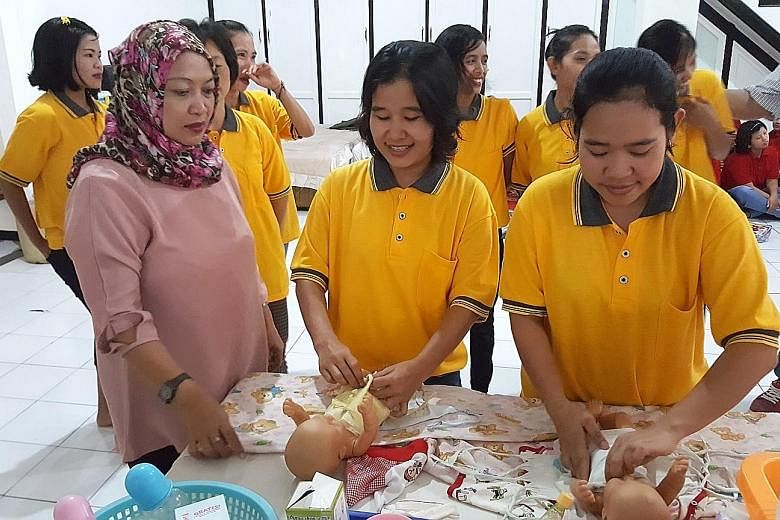She has never been overseas but, 25-year-old Dewi Jayanti, who is from a village in West Java, is now headed to Singaporeas a domestic helper. She is confident of her cleaning and cooking skills, but, learning the English language is a tough row to hoe for Ms Dewi, who went to secondary school.
"I have been speaking Bahasa Indonesia all my life," she told The Sunday Times. "But I will work very hard because I'm my family's breadwinner."
Indonesia now has a plan to help women like Ms Dewi. A pilot programme, aimed at equipping workers with language skills and cultural knowledge of the countries they are being sent to, is expected to kick off in February next year.
Workers will have to undergo the two-month programme before they can take up training in other areas, such as cooking and caring for children or the elderly. A government-linked body will test their competencies before certifying them for an overseas posting.
Indonesia's Manpower Ministry says the initiative is a signal that the government is serious about upgrading the skills of workers.
-
Specialisation of skills 'not practical'
-
One of the objectives of Indonesia's new training scheme for maids is to eventually phase out "multi-taskers", but Singapore's officials say having maids do a single job in the household may not be practical.
Under the pilot, maids are trained up to five months in language and culture, as well as in at least one of these skills: housekeeping, gardening, driving, cooking, childcare, babysitting, and caretaking. They will be sent to Malaysia first, and then to Singapore, Hong Kong and Taiwan if the scheme is successful.
"We want workers to have a clear job scope. Now, some maids work from early morning until late at night," said ministry official Soes Hindharno .
Singapore's Ministry of Manpower said improving skills of foreign domestic workers (FDWs) is a good initiative. "However, if the plan is to restrict FDWs to perform only specific tasks after training, Singapore employers and employment agencies will need to weigh the implications of such specialisation," a ministry spokesman said. "Those who find that the arrangement cannot meet their needs will likely consider alternative options, including hiring FDWs from other countries."
Centre for Domestic Employees chairman Yeo Guat Kwang said it is "not practical at all".
"In Singapore, we are all very small families, and we all live in a much more congested, modernised living environment. In most cases, the domestic workers are required to multi-task," he said.
Workers should be supported with relevant skills for different household work, and are protected by fair employment terms and get salaries that match their skills, he said.
Arlina Arshad
"It will be a basic model for the private sector to follow so as to raise the competence and quality of our workers," said Mr Khairul Anwar, the ministry's director-general for training and productivity.
Raising the "social image" of Indonesians and improving the welfare of workers remain part of President Joko Widodo's plan to professionalise the "informal employment" sector that domestic help is classified as in the country.
Labour authorities have been considering various strategies, including having workers live separately from employers in dormitories, and setting up a "one-door facility" to process paperwork for workers. Manpower officials have, since last month, met their counterparts in the region. They will visit Singapore this week to discuss maid welfare issues.
Employment agents, trainers of domestic workers and migrant activists in Singapore and Indonesia had mixed reactions to the new scheme.
Singapore maid agent Helen Tan, who is managing director of Contact Asia, welcomed the scheme and said it may help set the "minimum standard" in language abilities and minimise communication problems between workers and employers.
Ms Anis Hidayah, executive director of Migrant Care, a local migrant group, said stronger government control in workers' training and hiring would help to quash the "maid mafia", or unofficial middlemen, who dupe women in the provinces into working as maids and saddle them with hefty debts such as training, lodging and travelling costs.
"Such comprehensive training programmes are long overdue," she added. "Businesses seek to make profits, so stringent certification (will) mean they cannot simply place out less-than-qualified workers."
Others, however, pointed out that longer training may not necessarily raise the quality of workers but, instead, add to their financial burden.
"The longer the training, the higher the opportunity costs," said Ms Kellynn Wee, research and communications officer from the National University of Singapore's Asia Research Institute, which conducts studies on the maid industry. She added that additional training will inevitably also rack up costs.
"Will they fall on the worker by entrenching or adding to their placement loans?" asked Ms Wee.
Indonesian industry players say the government tends to over-regulate and that schemes are often not well implemented. Some also say having local officials take over the recruitment of such workers may open the door to corruption.
Ms Ellen Rahmalaili, who manages Della Fadhil Anugrah, an Indonesian employment agency, agrees. "It sounds good in theory but it's not practical," she said, adding that it is a tall order to ask these women to study a language for two months without the guarantee of a job. "After all that effort, they may fail the subsequent medical tests and drop out. No employer will also want to wait too long for a domestic worker anyway."

